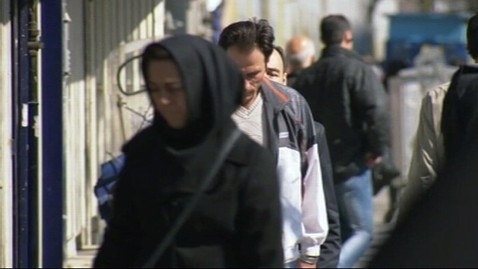Iranians Feel the Squeeze From U.S. Sanctions Aimed at Their Leaders
ABC News anchor David Muir and his team have traveled to Iran for a special Inside Iran report from the streets of Tehran, revealing the effects of Washington's tightening sanctions on the country.
Today, we went in search of one of the biggest pharmacies in central Tehran, after hearing that life-saving medicine was running out.
"Right now, we are running low on every kind of medicine," said Dr. Kheirollah Gholami, who runs the pharmacy.
He pointed straight to the ever-tightening U.S. sanctions, which are meant to force Iran's leaders, including Supreme Leader Ayatollah Ali Khamenei, to change course on their nuclear program.
Those sanctions are affecting everyone because the money flowing in and out of Iran is nearly frozen.
"When I can't pay you, how can you send the medicine to me?" Gholami said. He said that even though food and medicine were exempt from U.S. sanctions, it was a "Catch-22."
Cameras are rarely allowed free reign in Iran but Gholami let ABC News inside the pharmacy.
 e
e Image credit: ABC News
Immediately we saw lines as we snaked our way behind the counter. In the back, we found that the pharmacy was low on many medications and had run out of several cancer drugs.
Gholami said that 40 people today had sought one particular cancer drug.
"If we don't have," he said. "Nothing."
One man showed us a prescription for a loved one with leukemia. He had taken a cab from two hours away. Because of skyrocketing inflation here, we calculated that the ride had cost him more than $500.
He said he had been to more than 20 pharmacies before arriving at Gholami's. When he reached the counter's window, though, he was told to come back Saturday.
The U.S. Treasury's spokesperson said today that the U.S. did not sanction medicine and that this was Iranian spin.
"U.S. sanctions have never targeted Iranian humanitarian imports, including medicine. We have been very clear about this and we have seen that payment channels for these types of goods remain open and available," the spokesperson said. "The real problem concerning medical supplies in Iran seems to stem from the fact that the Iranian government has not allocated the money necessary for certain types of medical purchases, which is likely causing a shortage in some areas of the country. This was pointed out by the former Iranian health minister in December before she was promptly removed from her post."
In a new report from UN inspectors today, they said that they'd discovered new centrifuges at one of Iran's main nuclear sites, allowing the country to speed up the process to nuclear weapons.
The State Department responded, calling the findings "further escalation" and "another provocative step" - all just days before Iran is expected to return to the nuclear negotiating table with the United States and others Tuesday in Almaty, Kazakhstan, for the first time since talks collapsed eight months ago.
Iran denies an intention to build nuclear weapons.